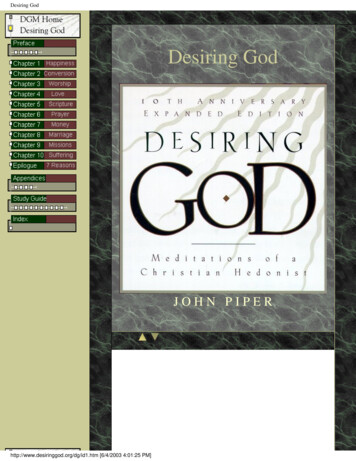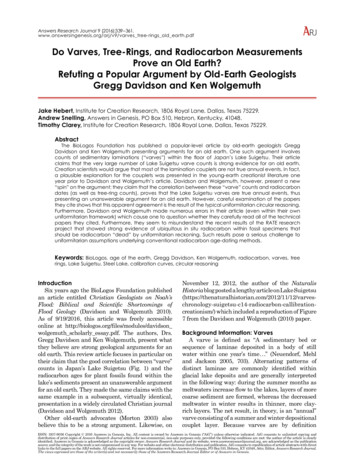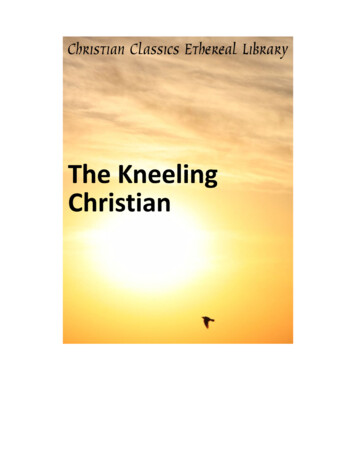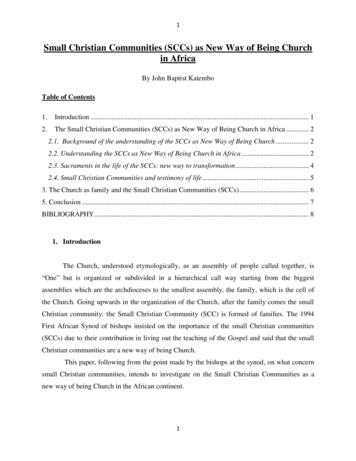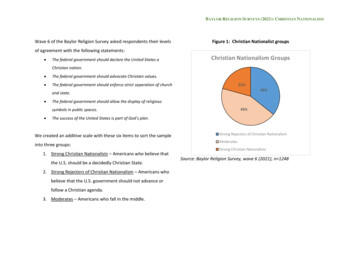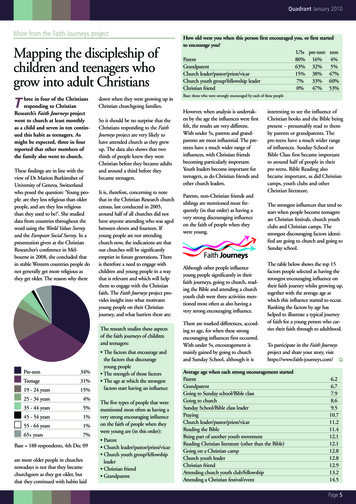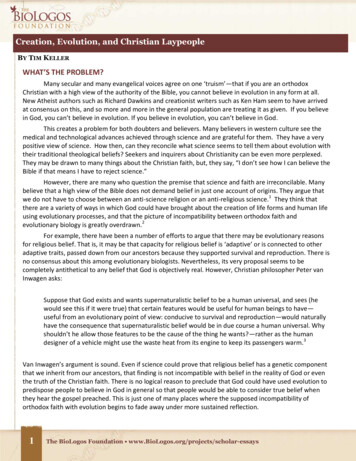
Transcription
Creation, Evolution, and Christian Laypeoplewww.BioLogos.orgBY TIM KELLERWHAT’S THE PROBLEM?Many secular and many evangelical voices agree on one ‘truism’—that if you are an orthodoxChristian with a high view of the authority of the Bible, you cannot believe in evolution in any form at all.New Atheist authors such as Richard Dawkins and creationist writers such as Ken Ham seem to have arrivedat consensus on this, and so more and more in the general population are treating it as given. If you believein God, you can’t believe in evolution. If you believe in evolution, you can’t believe in God.This creates a problem for both doubters and believers. Many believers in western culture see themedical and technological advances achieved through science and are grateful for them. They have a verypositive view of science. How then, can they reconcile what science seems to tell them about evolution withtheir traditional theological beliefs? Seekers and inquirers about Christianity can be even more perplexed.They may be drawn to many things about the Christian faith, but, they say, “I don’t see how I can believe theBible if that means I have to reject science.”However, there are many who question the premise that science and faith are irreconcilable. Manybelieve that a high view of the Bible does not demand belief in just one account of origins. They argue thatwe do not have to choose between an anti-science religion or an anti-religious science.1 They think thatthere are a variety of ways in which God could have brought about the creation of life forms and human lifeusing evolutionary processes, and that the picture of incompatibility between orthodox faith andevolutionary biology is greatly overdrawn.2For example, there have been a number of efforts to argue that there may be evolutionary reasonsfor religious belief. That is, it may be that capacity for religious belief is ‘adaptive’ or is connected to otheradaptive traits, passed down from our ancestors because they supported survival and reproduction. There isno consensus about this among evolutionary biologists. Nevertheless, its very proposal seems to becompletely antithetical to any belief that God is objectively real. However, Christian philosopher Peter vanInwagen asks:Suppose that God exists and wants supernaturalistic belief to be a human universal, and sees (hewould see this if it were true) that certain features would be useful for human beings to have—useful from an evolutionary point of view: conducive to survival and reproduction—would naturallyhave the consequence that supernaturalistic belief would be in due course a human universal. Whyshouldn’t he allow those features to be the cause of the thing he wants?—rather as the humandesigner of a vehicle might use the waste heat from its engine to keep its passengers warm. 3Van Inwagen’s argument is sound. Even if science could prove that religious belief has a genetic componentthat we inherit from our ancestors, that finding is not incompatible with belief in the reality of God or eventhe truth of the Christian faith. There is no logical reason to preclude that God could have used evolution topredispose people to believe in God in general so that people would be able to consider true belief whenthey hear the gospel preached. This is just one of many places where the supposed incompatibility oforthodox faith with evolution begins to fade away under more sustained reflection.1The BioLogos Foundation www.BioLogos.org/projects/scholar-essays
The BioLogos Foundation www.BioLogos.org/projects/scholar-essaysHowever, many Christian laypeople remain confused because the voices arguing that Biblicalorthodoxy and evolution are mutually exclusive are louder and more prominent than any others. What willit take to help Christian laypeople see greater coherence between what science tells us about creation andwhat the Bible teaches us about it?PASTORS AND THE PEOPLEIn my estimation what current science tells us about evolution presents four main difficulties fororthodox Protestants. The first is in the area of Biblical authority. To account for evolution we must see atleast Genesis 1 as non-literal. The questions come along these lines: what does that mean for the idea thatthe Bible has final authority? If we refuse to take one part of the Bible literally, why take any parts of itliterally? Aren’t we really allowing science to sit in judgment on our understanding of the Bible rather thanvica versa?The second difficulty is the confusion of biology and philosophy. Many of the strongest proponentsfor evolution as a biological process (such as Dawkins) also see it as a ‘Grand Theory of Everything.’ Theylook to natural selection to explain not only all human behavior but even to give the only answers to thegreat philosophical questions, such as why we exist, what life is about, and why human nature is what it is.Doesn’t belief in the one idea—that life is the product of evolution—entail the adoption of this whole ‘world-view’?The third difficulty is the historicity of Adam and Eve. One way to reconcile what current science saysabout evolution is to propose that the account of Adam and Eve is symbolic, not literal, but what does thisdo to the New Testament teaching of Romans 5 and 1 Corinthians 15 that our sinfulness comes from ourrelationship with Adam? If we don’t believe in an historical fall, how did we become what the Bible says weare—sinful and condemned?The fourth difficulty is the problem of violence and evil. One of the greatest barriers to belief in Godis the problem of suffering and evil in the world. Why, people ask, did God create a world in which violence,pain, and death are endemic? The answer of traditional theology is—he didn’t. He created a good world butalso gave human beings free will, and through their disobedience and ‘Fall’, death and suffering came intothe world. The process of evolution, however, understands violence, predation, and death to be the veryengine of how life develops. If God brings about life through evolution, how do we reconcile that with theidea of a good God? The problem of evil seems to be worse for the believer in theistic evolution.I have been a pastor for almost 35 years, and during that time I’ve spoken to many laypeople whostruggle with the relationship of modern science to orthodox belief. In the minds of most laypeople, it is thefirst three difficulties that loom largest. The fourth difficulty—the problem of suffering and death—has notbeen posed to me as often by parishioners. Yet in some ways the problem of suffering goes along with thethird question regarding the historicity of the Fall. Without the traditional view of the historicity of the Fall,the question of evil would seem to become more acute.Therefore, below I will lay out three basic problems that Christian laypeople have with the scientificaccount of biological evolution. Nothing here should be seen as meeting the need for rigorous, scholarlyarguments in answer to these questions. These are popular-level pastoral answers and guidance. As apastor I have had to draw heavily on the work of experts. The first question, about Biblical authority,requires that I draw on the best work of exegetes and Biblical scholars. To answer the second question,about evolution as a ‘Grand Theory of Everything,’ I need to draw on the work of philosophers. When wecome to the third question regarding Adam and Eve, I must look to theologians.2Creation, Evolution, and Christian LaypeopleBY TIM KELLER
The BioLogos Foundation www.BioLogos.org/projects/scholar-essaysIn short, if I as a pastor want to help both believers and inquirers to relate science and faithcoherently, I must read the works of scientists, exegetes, philosophers, and theologians and then interpretthem for my people. Someone might counter that this is too great a burden to put on pastors, that insteadthey should simply refer their laypeople to the works of scholars. But if pastors are not ‘up to the job’ ofdistilling and understanding the writings of scholars in various disciplines, how will our laypeople do it?This is one of the things that parishioners want from their pastors. We are to be a bridge between theworld of scholarship and the world of the street and the pew. I’m aware of what a burden this is. I don’tknow that there has ever been a culture in which the job of the pastor has been more challenging.Nevertheless, I believe this is our calling.THREE QUESTIONS OF CHRISTIAN LAYPEOPLEQuestion #1: If God used evolution to create, then we can’t take Genesis 1 literally, and if we can’t dothat, why take any other part of the Bible literally?Answer: The way to respect the authority of the Biblical writers is to take them as they want to be taken.Sometimes they want to be taken literally, sometimes they don’t. We must listen to them, not impose ourthinking and agenda on them.Genre and authorial intent.The way to take the Biblical authors seriously is to ask ‘how does this author want to beunderstood?’ This is common courtesy as well as good reading. Indeed it is a way to practice the GoldenRule. We all want people to take time to consider whether we want to be taken literally or not. If you writea letter to someone saying, “I just wanted to strangle him!” you will hope your reader understands you tobe speaking metaphorically. If she calls the police to arrest you, you can rightly complain that she shouldhave made the effort to ascertain whether you meant to be taken literally or not.The way to discern how an author wants to be read is to distinguish what genre the writer is using.In Judges 5:20, we are told that the stars in the heavens came down and fought against the Syrians onbehalf of the Israelites, but in Judges 4, which recounts the battle, no such supernatural occurrence ismentioned. Is there a contradiction? No, because Judges 5 has all the signs of the genre of Hebrew poetry,while Judges 4 is historical prose narrative. Judges 4 is an account of what happened, while Judges 5 isDeborah’s Song about the theological meaning of what happened. When you get to Luke 1:1ff., we readthe author insisting that everything in the text is an historical account checked against the testimony ofeyewitnesses. That again is an unmistakable sign that the author wants to be taken ‘literally’ as describingactual events.This does not mean that the Biblical author’s intent and the genre are always clear. Genesis 1 andthe book of Ecclesiastes are two examples of places in the Bible where there will always be debate, becausethe signs are not crystal clear. But the principle is this--to assert that one part of Scripture shouldn’t betaken literally does not at all mean that no other parts should be either.3Creation, Evolution, and Christian LaypeopleBY TIM KELLER
The BioLogos Foundation www.BioLogos.org/projects/scholar-essaysGenre and Genesis 1.So what genre is Genesis 1? Is it prose or poetry? In this case, that is a false choice. Edward J. Young,the conservative Hebrew expert who reads the six-days of Genesis 1 as historical, admits that Genesis 1 iswritten in ”exalted, semi-poetical language”.4 On the one hand, it is a narrative that describes a successionof events, using the wayyigtol expression characteristic of prose, and it does not have the key mark ofHebrew poetry, namely parallelism. So for example, in Miriam’s Song of Exodus 15 we clearly see the signsof poetic recapitulation or restatement that is poetic parallelism:“Pharaoh’s chariots and his army he has hurled into the sea;The best of Pharaoh’s officers are drowned in the Red Sea.The deep waters covered them;They sank to the depths like a stone.” (Exodus 15:4-5)On the other hand, as many have noted, Genesis 1’s prose is extremely unusual. It has refrains, repeatedstatements that continually return as they do in a hymn or song. There are many examples, including theseven-time refrain, “and God saw that it was good” as well as ten repetitions of “God said”, ten of “let therebe”, seven repetitions of “and it was so,” as well as others. Obviously, this is not the way someone writes inresponse to a simple request to tell what happened.5 In addition, the terms for the sun (“greater light”) andmoon (“lesser light”) are highly unusual and poetic, never being used anywhere else in the Bible, and “beastof the field” is a term for animal that is ordinarily confined to poetic discourse. 6 All this leads Collins toconclude that the genre is:“.what we may call exalted prose narrative. This name for the genre will serve us in several ways.First, it acknowledges that we are dealing with prose narrative which will include the making oftruth claims about the world in which we live. Second, by calling it exalted, we are recognizing that we must not impose a ‘literalistic’ hermeneutic on the text.”7Perhaps the strongest argument for the view that the author of Genesis 1 did not want to be taken literallyis a comparison of the order of creative acts in Genesis 1 and Genesis 2. Genesis 1 shows us an order ofcreation that does not follow a 'natural order' at all. For example, there is light (Day 1) before there are anysources of light--the sun, moon, and stars (Day 4). There is vegetation (Day 3) before there was anyatmosphere (Day 4 when the sun was made) and therefore there was vegetation before rain was possible.Of course, this is not a problem per se for an omnipotent God. But Genesis 2:5 says: “When the Lord Godmade the earth and heavens--and no shrub of the field had yet appeared on the earth, and no plant of thefield had yet sprung up, because the Lord God had not sent rain on the earth, and there was no man to workthe ground." Although God did not have to follow what we would call a ‘natural order’ in creation, Genesis2:5 teaches that he did. It is stated categorically: God did not put vegetation on the earth before there wasan atmosphere and rain. But in Genesis 1 we do have vegetation before there is any rain possible or anyman to till the earth. In Genesis 1 natural order means nothing--there are three 'evenings and mornings'before there is a sun to set! But in Genesis 2 natural order is the norm. 84Creation, Evolution, and Christian LaypeopleBY TIM KELLER
The BioLogos Foundation www.BioLogos.org/projects/scholar-essaysThe conclusion—we may read the order of events as literal in Genesis 2 but not in Genesis 1, or(much, much more unlikely) we may read them as literal in Genesis 1 but not in Genesis 2. But in any case,you can’t read them both as straightforward accounts of historical events. Indeed, if they are both to beread literalistically, why would the author have combined the accounts, since they are (on that reading)incompatible? The best answer is that we are not supposed to understand them that way. In Exodus 14-15(the Red Sea crossing) and Judges 4-5 (Israel’s defeat of Syria under Sisera) there is an historical accountjoined to a more poetical ‘song’ that proclaims the meaning of the event. Something like that may be whatthe author of Genesis has in mind here.So what does this mean? It means Genesis 1 does not teach that God made the world in six twentyfour hour days. Of course, it doesn’t teach evolution either, because it doesn’t address the actual processesby which God created human life. However, it does not preclude the possibility of the earth being extremelyold.9 We arrive at this conclusion not because we want to make room for any particular scientific view ofthings, but because we are trying to be true to the text, listening as carefully as we can to the meaning ofthe inspired author.Question#2: If biological evolution is true—does that mean that we are just animals driven by our genes,and everything about us can be explained by natural selection?Answer: No. Belief in evolution as a biological process is not the same as belief in evolution as a worldview.Today every effort is being made to insist that belief in the process of biological evolution leadsnecessarily to belief in ‘perennial naturalism’ (to use Alvin Plantinga’s term),10 the view that everythingabout human nature—our ability to love, act, think, form beliefs, use language, have moral convictions, putfaith in God, and do art and philosophy—can all be understood as originating in random genetic mutation orsome other source of variability, and prevailing in the human race today only because of natural selection.We may feel that some behaviors are universally right and should be performed, and some thingsuniversally wrong and should not be done, whether those behaviors promote your survival or not. Butperennial naturalism insists that those feelings are there not because they are universally true, but only andentirely because they helped your ancestors survive.One of the cardinal principles of the ‘new atheists’ is that perennial naturalism automatically flowsfrom belief in the biological evolution of species. A great example was Sam Harris’ recent castigation ofFrancis Collins, after he was nominated to be head of NIH. Harris was deeply troubled that Collins as aChristian believer understood that human nature had aspects (such as intuition of God’s Moral Law) whichscience could not explain. Collins was denying, therefore, that science could provide ‘answers to the mostpressing questions of human existence.’ This troubled Harris. He wrote:“As someone who believes that our understanding of human nature can be derived fromneuroscience, psychology, cognitive science and behavioral economics, among others, I am troubledby Dr. Collins’s line of thinking Must we really entrust the future of biomedical research in theUnited States to a man who sincerely believes that a scientific understanding of human nature isimpossible?”115Creation, Evolution, and Christian LaypeopleBY TIM KELLER
The BioLogos Foundation www.BioLogos.org/projects/scholar-essaysThe argument here is clear. If you believe human life was formed through evolutionary biological processes(from here on, referred to as EBP), you must therefore believe in the Grand Theory of Evolution (from hereon, referred to as GTE) as the explanation for every aspect of human nature. Collins, he says, should see thathuman beings have no ‘immortal soul, free will, *knowledge of the moral law, spiritual hunger, genuinealtruism’ based on our relationship with God.12 Evolution, Harris claims, has shown that these things areillusions. All features of human life have a natural, scientifically explicable cause. If you believe in EBP, youmust believe in GTE.GTE is fast becoming what Peter Berger calls a ‘plausibility structure’. It is a set of beliefs consideredso basic, and with so much support from authoritative figures and institutions, that it is becoming impossiblefor individuals to publicly question them. A plausibility structure is a ‘given’ supported by enormous socialpressure. The writings of the new atheists here are important to observe because their attitudes are morepowerful than their arguments. The disdain and refusal to show any respect to opponents is not actually aneffort to refute them logically, but to ostracize them socially and turn their own views into a plausibilitystructure. They are well on their way.This creates a problem for the Christian layperson if they hear their teachers or preachers tellingthem that God could have used EBP to bring about life forms. Evolution as a ‘Grand Theory’ is now beingused at the popular level to explain nearly everything about human behavior.Many Christian laypeople resist all this and seek to hold on to some sense of human dignity bysubscribing to ‘fiat-creationism.’ This is not a sophisticated theological and philosophical move; it is intuitive.In their mind ‘evolution’ is one big ball of wax. It seems to them that, if you believe in evolution, humanbeings are just animals under the power of their inner, genetically-produced drives. I have seen Christians ina Bible study on Genesis 1-2 read the following quote and become confused:"If 'evolution' is elevated to the status of a world-view of the way things are, then there is directconflict with biblical faith. But if 'evolution' remains at the level of scientific biological hypothesis, itwould seem that there is little reason for conflict between the implications of Christian belief in theCreator and the scientific explorations of the way which--at the level of biology--God has gone abouthis creating processes." 13Atkinson is saying that you can believe in EBP and not GTE. I have seen intelligent, educated laypeople reallystruggle with the distinction Atkinson has made. Nevertheless, this is exactly the distinction they must make,or they will never grant the importance of EBP.How can we help them? I believe that Christian pastors, theologians, and scientists who want toargue for an EBP account of origins must put a great deal of emphasis at the same time on arguing againstGTE. Christian philosophers have paved the way here and there are many good critiques of philosophicalnaturalism. Many know about Alvin Plantinga’s ‘Evolutionary Argument against Naturalism’ in which, muchlike C.S. Lewis in his book Miracles, he argues that “Evolution is interested (so to speak) only in adaptivebehavior, not in true belief. Natural selection doesn’t care what you believe; it is interested only in how youbehave.”14 The argument goes like this. Does natural selection (alone) give us cognitive faculties (senseperception, rational intuition about those perceptions, and our memory of them) that produce true beliefs6Creation, Evolution, and Christian LaypeopleBY TIM KELLER
The BioLogos Foundation www.BioLogos.org/projects/scholar-essaysabout the real world? In as far as true belief produces survival behavior—yes. But who can say how far thatis? If a theory makes it impossible to trust our minds, then it also makes it impossible to be sure aboutanything our minds tell us--including macro-evolution itself-- and everything else.15 Any theory that makes itimpossible to trust our minds is self-defeating.Another very important area where we must ‘push back’ against GTE is in its efforts to explain awaymoral intuitions. An excellent recent volume where, again, Christian philosophers take the lead is JeffreySchloss, ed. The Believing Primate: Scientific, Philosophical, and Theological Reflections on the Origin ofReligion (Oxford, 2009.) See especially Christian Smith’s chapter “Does Naturalism Warrant a Moral Belief inUniversal Benevolence and Human Rights?” (By the way, his conclusion is ‘no.’)So what does this mean? Many orthodox Christians who believe in EBP often find themselvesattacked by those Christians who do not. But it might reduce the tensions between believers over evolutionif they could make common cause against GTE. Most importantly, it is the only way to help Christianlaypeople make the distinction in their minds between evolution as biological mechanism and as Theory ofLife.Question #3: If biological evolution is true and there was no historical Adam and Eve how can we knowwhere sin and suffering came from?Answer: Belief in evolution can be compatible with a belief in an historical fall and a literal Adam and Eve.There are many unanswered questions around this issue and so Christians who believe God used evolutionmust be open to one another’s views.My answers to the first two sets of questions are basically negative. I resist the direction of inquirer’sthought. I don’t believe you have to take Genesis 1 as a literal account, and I don’t think that to believehuman life came about through EBP you necessarily must support evolution as the GTE.However, I find the concerns of this question much more well-grounded. Indeed, I must disclose, Ishare them. Many orthodox Christians who believe God used EBP to bring about human life not only do nottake Genesis 1 as history, but also deny that Genesis 2 is an account of real events. Adam and Eve, in theirview, were not historical figures but an allegory or symbol of the human race. Genesis 2, then, is a symbolicstory or myth which conveys the truth that human beings all have and do turn away from God and aresinners.Before I share my concerns with this view, let me make a clarification. One of my favorite Christianwriters (that’s putting it mildly), C.S.Lewis, did not believe in a literal Adam and Eve, and I do not questionthe reality or soundness of his personal faith. But my concern is for the church corporately and for itsgrowth and vitality over time. Will the loss of a belief in the historical fall weaken some of our historical,doctrinal commitments at certain crucial points? Here are two points where that could happen.The trustworthiness of Scripture.The first basic concern has to do with reading the Bible as a trustworthy document. Traditionally,Protestants have understood that the writers of the Bible were inspired by God and that, therefore,7Creation, Evolution, and Christian LaypeopleBY TIM KELLER
The BioLogos Foundation www.BioLogos.org/projects/scholar-essaysdiscerning the human author’s intended meaning is the way that we discern what God is saying to us in aparticular text.16What, then, were the authors of Genesis 2-3 and of Romans 5, who both speak of Adam, intendingto convey? Genesis 2-3 does not show any of signs of ‘exalted prose narrative’ or poetry. It reads as theaccount of real events; it looks like history. This doesn’t mean that Genesis (or any text of the Bible) ishistory in the modern, positivistic sense. Ancient writers who were telling about historical events felt free todischronologize and compress time frames – to omit enormous amounts of information that modernhistorians would consider essential to give ‘the complete picture.’ However, ancient writers of history stillbelieved that the events they were describing actually happened.Ancient writers also could use much figurative and symbolic language. For example, Bruce Waltkepoints out that when the Psalmist says, “you knit me together in my mother’s womb” (Ps 139:13) he was notsaying that he hadn’t developed in the perfectly normal biological ways. It is a figurative way to say that Godinstituted and guided the biological process of human formation in his mother’s womb. So when we are toldthat God ‘formed Adam from the dust of the ground’ (Gen 2:7), the author might be speaking figuratively inthe same way, meaning that God brought man into being through normal biological processes. 17 Hebrewnarrative is incredibly spare—it is only interested in telling us what we need to know to learn the teachingthe author wants to convey.Despite the compression, omissions, and figurative language, are there signs in the text that this is amyth and not an historical account? Some say that we must read Genesis 2-11 in light of other ancientcreation myths of the Near Eastern world. Since other cultures were writing myths about events like thecreation of the world and the great flood, this view goes, we should recognize that the author of Genesis 2-3was probably doing the same thing. In this view, the author of Genesis 2-3 was simply recounting a Hebrewversion of the myth of creation and flood. He may even have believed that the events did happen, but inthat he was merely being a man of his time.Kenneth Kitchen, however, protests that this is not how things worked. The prominent Egyptologistand evangelical Christian, when responding to the charge that the flood narrative (Genesis 9) should be readas ‘myth’ or ‘proto-history’ like the other flood-narratives from other cultures, answered:The ancient Near East did not historicize myth (i.e. read it as imaginary ‘history’.) In fact, exactly thereverse is true—there was, rather, a trend to ‘mythologize’ history, to celebrate actual historicalevents and people in mythological terms .18In other words, the evidence is that Near Eastern ‘myths’ did not evolve over time into historical accounts,but rather historical events tended to evolve over time into more mythological stories. Kitchen’s argument isthat, if you read Genesis 2-11 in light of how ancient Near Eastern literature worked, you would conclude, ifanything, that Genesis 2-11 were ‘high’ accounts, with much compression and figurative language, of eventsthat actually happened. In summary, it looks like a responsible way of reading the text is to interpretGenesis 2-3 as the account of an historical event that really happened.The other relevant text here is Romans 5:12ff, where Paul speaks of Adam and the fall. It is evenclearer that Paul believed that Adam was a real figure. N.T. Wright, in his commentary on Romans says:8Creation, Evolution, and Christian LaypeopleBY TIM KELLER
The BioLogos Foundation www.BioLogos.org/projects/scholar-essaysPaul clearly believed that there had been a single first pair, whose male, Adam, had been given acommandment and had broken it. Paul was, we may be sure, aware of what we would call mythicalor metaphorical dimensions to the story, but he would not have regarded these as throwing doubton the existence, and primal sin, of the first historical pair.19So we arrive at this point. If you hold to the view that Adam and Eve were not literal, and you realize theauthor of Genesis was probably trying to teach us that Adam and Eve were real people who sinned, andthat Paul certainly was, then you have to face the implications for how you read Scripture. You may say,“Well, the Biblical authors were ‘men of their time’ and were wrong about something they were trying toteach readers.” The obvious question is, “how will we know which parts of the Bible to trust and whichnot?”I am not arguing something so crude as “if you don’t believe in a literal Adam and Eve, then youdon’t believe in the authority of the Bible!” I contended above that we cannot take every text in the Bibleliterally. But the key for interpretation is the Bible itself. I don’t believe Genesis 1 can be taken literallybecause I don’t think the author expected us to. But Paul is different. He most definitely wante
evolutionary biology is greatly overdrawn.2 For example, there have been a number of efforts to argue that there may be evolutionary reasons for religious belief. That is, it may be that capacity for religious belief is adaptive or is connected to other adaptive traits, passed down from our ancestors because they supported survival and .
